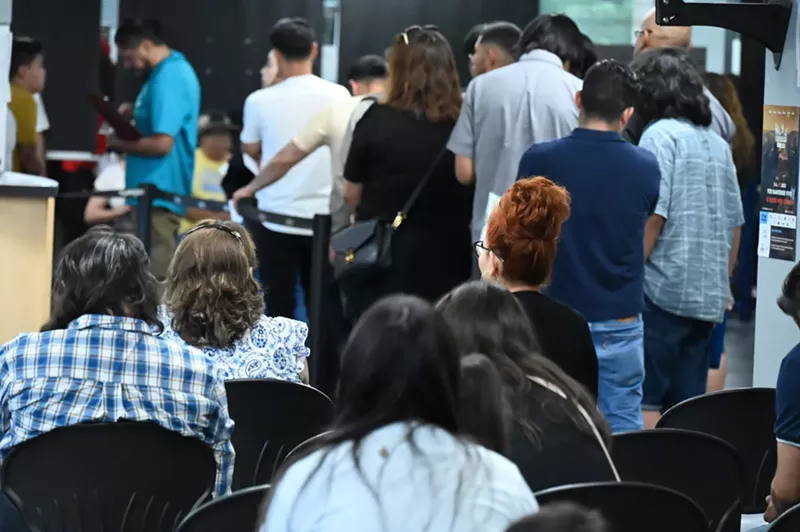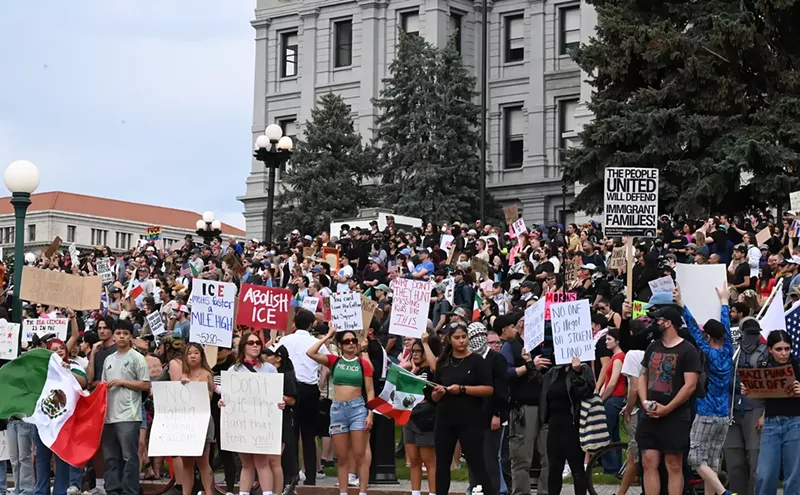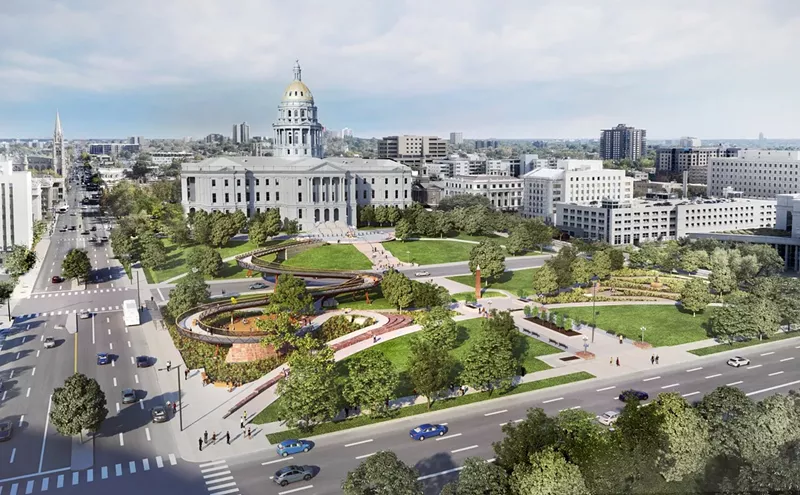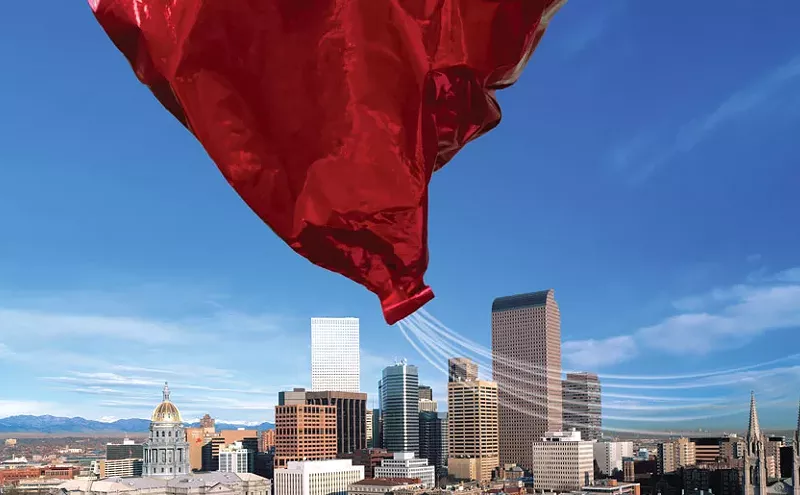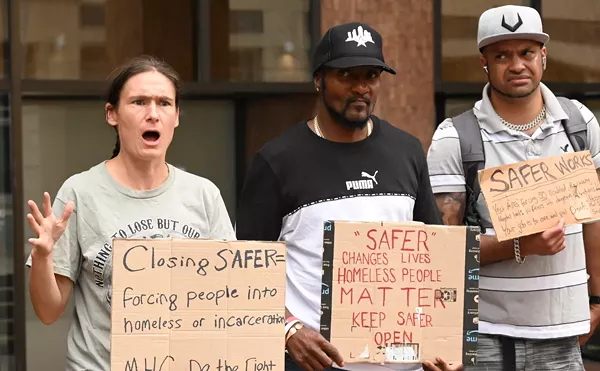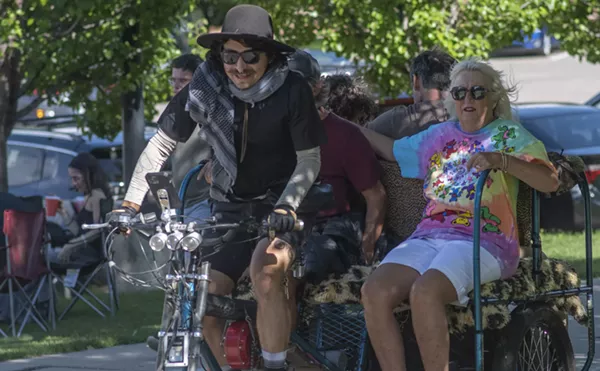"It is great that they love our country, that they want to be there. It is cheaper, they have more opportunities to buy real property," Miguel Barradas, who handles legal affairs for the consulate, says of Mexico's new residents. "They are more than welcome to apply for any kind of permit to stay in Mexico, but we want to make sure they know that the process is carried out here in the consulate. We don't use intermediaries."
Over the last couple of months, dozens of online scams have targeted people seeking the Denver consulate's assistance in securing a temporary or permanent Mexican resident visa, which are mostly taken out by Americans near retirement age. People usually fall for these scams while looking for workarounds through long wait times and red tape, Barradas says.
"It's the lack of knowledge and people wanting to make the process easier," he explains. "If I can go online and pay $1,000 and not have to see any faces or pass through any bureaucracy, then that's fine for me."
Scammers advertise on Facebook and other social media platforms with promises of quick visa appointments or streamlining the entire process. The false ads will offer a phone number or email; once people reach out, scammers will pose as consulate staff and give people instructions that end with transferring money.
"We detected posts on social media offering these kinds of services," Barradas says. "So nowadays we're trying to make this process more secure."
This problem is unique to the Rocky Mountain region.
There are over fifty Mexican consulates in the U.S., but the Denver office, which services Colorado and Wyoming, is the only one dealing with a high rate of visa scams, according to Barradas. Because of this, the Denver consulate has shut down its web page for making visa appointments, as websites are easier for scammers to mimic and the consulate believed that having two ways to make visa appointments confused people.
Having one way to request visas makes the process easier to monitor, he adds.
"Sadly, we see these cases," Barradas says. "We are all trying to fight this kind of scamming, because it is not the best impression. If you want an appointment, contact us, and you're going to get an appointment at some point."
Anyone seeking a Mexican resident visa through the Denver consulate is asked to schedule an appointment using the email [email protected]. This is the only channel open for requesting visas through the Denver consulate at the moment, Barradas stresses.
Visa appointments are free, with a $54 charge that comes after the visa has been granted. Barradas says that scammers are asking for upwards of $1,000 to make fake appointments with the Denver consulate. In the last two months, more people have shown up claiming they have "emergency appointments," which the consulate doesn't offer, he adds.
"Many of these people, the vast majority of them, have been scammed by people who take advantage of the absence of knowledge about the process," Barradas says. "If anyone has any questions, if anyone encounters someone offering help in exchange for money, they can contact us through our official channels. They can visit us here. We normally provide information to people face-to-face."
According to Barradas, people can reach out with visa questions through the same email used for making appointments or through [email protected], which is used for general inquiries.
"Many of these people, the vast majority of them, have been scammed by people who take advantage of the absence of knowledge about the process," Barradas says. "If anyone has any questions, if anyone encounters someone offering help in exchange for money, they can contact us through our official channels. They can visit us here. We normally provide information to people face-to-face."
According to Barradas, people can reach out with visa questions through the same email used for making appointments or through [email protected], which is used for general inquiries.
These visa scams come as the Mexican consulates in the U.S. deal with an increased workload. President Donald Trump returned to power in January, ramping up immigration enforcement, and the majority of immigrants in the U.S. and in Colorado come from Mexico. According to U.S. Census data, more than 200,000 Mexican immigrants living in the state. Mexican immigrants are seeking consul services to prepare in case they're deported, according to Barradas.
The number of U.S. citizens with Mexican parents coming to the Denver consulate to attain their Mexican citizenship has quadrupled so far this year compared with the same January-July time span in previous years, Barradas says.
This stat isn't unique to Denver, though.
"We've seen a huge increase, at least 400 percent just this year, mainly because of the political situation," he says. "At this point, we are completely full of requests. We even had to internally make changes to have more people helping in that area. That's not just us. All 53 consulates are full of requests for dual citizenship."
Appointments for Mexican citizenship are backed up at the Denver consulate until October, says Barradas, who notes that wait times for Mexicans at American consulates are much worse. According to Barradas, Mexican citizens have to wait as long as two years before getting an appointment for a U.S. visa.
Mexican citizenship is in high demand among families with mixed immigration status, because many fear that if the head of their household is deported, the whole family will have to follow. Mexican parents with children born in the U.S. are seeking citizenship for their children to ensure a seamless transition into Mexican life, such as enrolling in school and getting work when they're older, according to Barradas.
In February, Pável Meléndez Cruz, the consul general of Mexico in Denver, said that the Mexican government is committed to protecting the rights of its citizens living in the United States, a message he relayed from Mexican President Claudia Sheinbaum. At the time, Meléndez Cruz said that the consulate was seeing an "exponential increase" in Americans seeking Mexican citizenship that began in November as a result of Trump's re-election.
"People have more concerns, and they're more worried," Meléndez Cruz said. "Obviously, fear is hard to measure, it's not exactly tangible, but we do see the worry in their faces."
Hasta la Visa, Baby
Attaining a Mexican resident visa is a simple process, according to Barradas, but applicants need to save up a hefty chunk of change to qualify.
For a temporary resident visa, applicants must prove they've had at least $75,000 in the bank during the past twelve months. Meanwhile, a permanent resident visa requires a bank account with more than $300,000 in the bank for the same amount of time. Mexican resident visas are mostly favored by retirees seeking warm climes and cheap prices to stretch their pensions and savings, Barradas says.
"Many of them are retirees, elders, persons who already have investments here in the U.S. who just want to go to Mexico and live there," he says. "Many American citizens want to move abroad, especially to Mexico, because of our health care options, cultural options, climate."
For a temporary resident visa, applicants must prove they've had at least $75,000 in the bank during the past twelve months. Meanwhile, a permanent resident visa requires a bank account with more than $300,000 in the bank for the same amount of time. Mexican resident visas are mostly favored by retirees seeking warm climes and cheap prices to stretch their pensions and savings, Barradas says.
"Many of them are retirees, elders, persons who already have investments here in the U.S. who just want to go to Mexico and live there," he says. "Many American citizens want to move abroad, especially to Mexico, because of our health care options, cultural options, climate."
Last year, the consulate in Denver issued 673 resident visas. Through July 3 of 2025, it has issued 381 resident visas, a 14 percent increase compared to the same period last year. Most of these requests, about 85 percent, are being made by U.S. citizens, but Canadians and Indians are also coming to the Denver consulate for a Mexican visa. Barradas says this kind of increase is consistent with what he's seen during the past decade.
"It's normally a 10 percent, 15 percent increase each year," Barradas says. "Many of them confess at their interview they want to live in Baja, they want to live in San Miguel de Allende, they want just to retire to a warmer place. The vast majority come from this kind of background."
Unlike citizenship requests, the increase in visa requests isn't driven by anger against Trump or deportation fears, according to what Barradas hears from American applicants.
"It might be, but they don't express that kind of circumstance as the reason for their departure," he says. "They'll express their desire to go for economic reasons. A pension from here is more than enough to live very well in Mexico."
"It might be, but they don't express that kind of circumstance as the reason for their departure," he says. "They'll express their desire to go for economic reasons. A pension from here is more than enough to live very well in Mexico."
Visa scams have likely been going on for a while, Barradas says, but it was never a major concern for the consulate until the last two months, when people became "more vocal" about paying for appointments. Barradas estimates that half of the people who showed up to the Denver consulate for visa appointments during the last couple of months said they paid for an appointment, meaning they'd been scammed.
U.S. citizens are allowed to travel to Mexico without a visa as long as their stay is shorter than 180 days, or about six months. Any longer stays requires a visa, but once American citizens exit the country, they can re-enter without a visa.
Temporary visas are good for up to a year and can be renewed a max of four times. Permanent visas don't expire, and a legal resident can apply for Mexican citizenship after living in the country continuously for five years, a policy the U.S. has too, although American visas are harder to attain. Mexican resident visas also give U.S. citizens the right to buy real estate in Mexico, according to Barradas, but it doesn't allow them to work in Mexico.
Like with the Mexican citizenship process, visa appointments are backed up by about two months, according to Barradas. Still, he encourages Americans to move to Mexico, as long as they're peaceful and meet the legal requirements.
"We have a beautiful country. We love to show our country, and if they want to live there peacefully and be part of our culture, be part of our traditions, they're more than welcome," Barradas says. "Everyone is welcome in Mexico as long as you meet the criteria."
Like with the Mexican citizenship process, visa appointments are backed up by about two months, according to Barradas. Still, he encourages Americans to move to Mexico, as long as they're peaceful and meet the legal requirements.
"We have a beautiful country. We love to show our country, and if they want to live there peacefully and be part of our culture, be part of our traditions, they're more than welcome," Barradas says. "Everyone is welcome in Mexico as long as you meet the criteria."

